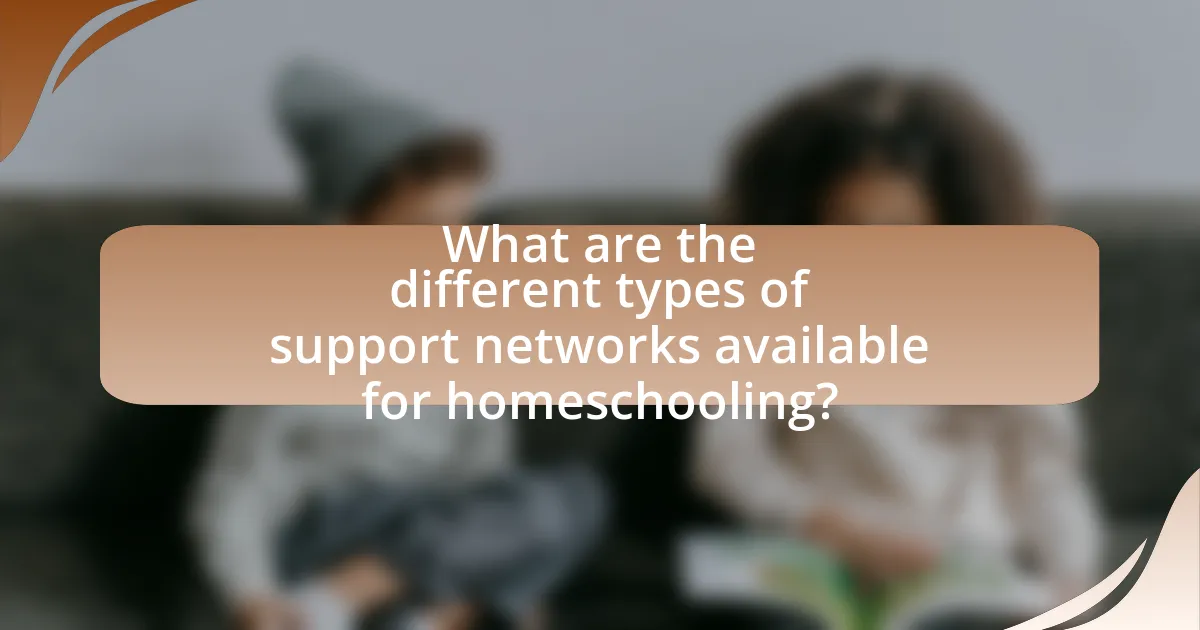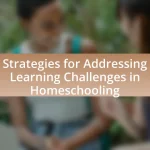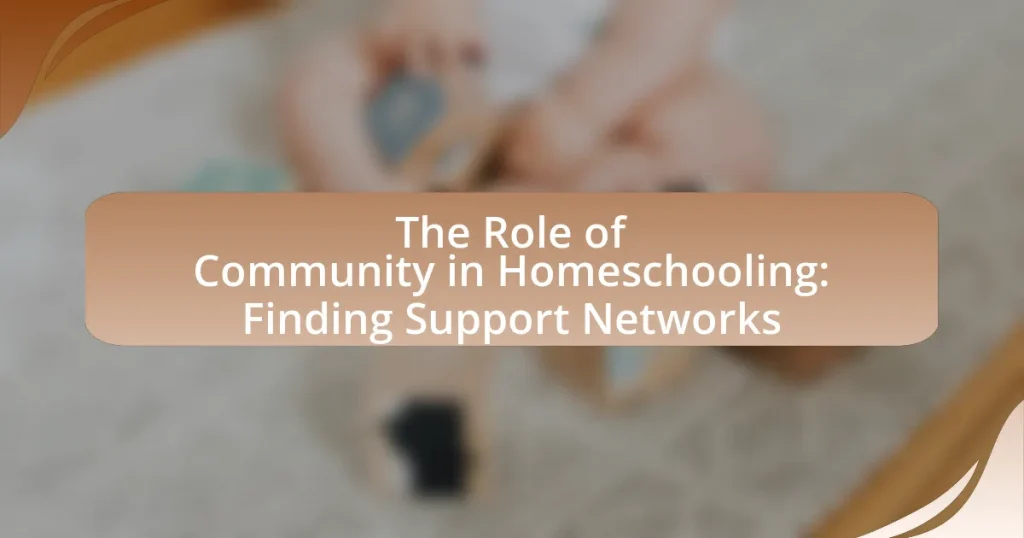The article focuses on the critical role of community in homeschooling, emphasizing the importance of support networks for homeschooling families. It outlines how community involvement enhances educational experiences through shared resources, social interaction, and emotional encouragement. Key topics include the benefits of local homeschooling groups, co-ops, online forums, and the impact of community engagement on student learning outcomes. Additionally, the article addresses the challenges faced by families without a support network and provides practical strategies for building and maintaining these essential connections.

What is the role of community in homeschooling?
The role of community in homeschooling is to provide essential support, resources, and social interaction for homeschooling families. Communities often facilitate co-ops, where families collaborate to share teaching responsibilities and resources, enhancing educational experiences. Research indicates that participation in homeschooling communities can lead to improved academic outcomes and increased parental confidence in teaching, as families exchange ideas and strategies. For instance, a study published in the Journal of School Choice found that 85% of homeschooling parents reported feeling more supported and effective when involved in local homeschooling groups.
How does community support enhance the homeschooling experience?
Community support enhances the homeschooling experience by providing resources, social interaction, and emotional encouragement. Access to local homeschooling groups allows families to share educational materials, organize group activities, and participate in co-ops, which can enrich the curriculum and provide diverse learning opportunities. Research indicates that children who engage in social activities with peers show improved social skills and emotional well-being, which are critical components of a well-rounded education. Additionally, support from other homeschooling families can alleviate feelings of isolation, fostering a sense of belonging and community that is essential for both parents and children in the homeschooling journey.
What types of community support are available for homeschooling families?
Homeschooling families can access various types of community support, including local homeschooling groups, co-ops, online forums, and educational resources. Local homeschooling groups often provide socialization opportunities, shared resources, and group activities, fostering a sense of community among families. Co-ops allow families to collaborate on teaching specific subjects, pooling expertise and resources for a more enriched educational experience. Online forums and social media groups offer platforms for sharing advice, resources, and experiences, connecting families across broader geographic areas. Additionally, many communities provide access to libraries, museums, and extracurricular activities tailored for homeschoolers, enhancing the educational experience.
How does community involvement impact student learning outcomes?
Community involvement significantly enhances student learning outcomes by providing additional resources, support, and real-world learning opportunities. Engaging with local organizations, businesses, and volunteers allows students to access diverse educational experiences that complement their academic curriculum. Research indicates that students involved in community-based projects demonstrate improved academic performance, higher motivation, and better social skills. For instance, a study published in the “Journal of Educational Psychology” found that students participating in community service projects scored 20% higher on standardized tests compared to their peers who did not engage in such activities. This evidence underscores the positive correlation between community involvement and enhanced educational achievement.
Why is finding a support network crucial for homeschooling families?
Finding a support network is crucial for homeschooling families because it provides essential resources, emotional support, and social interaction. Homeschooling can be isolating, and a support network helps families connect with others who share similar educational philosophies and challenges. Research indicates that 85% of homeschooling parents report feeling more confident and motivated when they engage with a community, which enhances their teaching effectiveness and their children’s learning experiences. Additionally, support networks often offer access to co-ops, extracurricular activities, and shared resources, which can significantly enrich the homeschooling experience.
What challenges do homeschooling families face without a support network?
Homeschooling families face significant challenges without a support network, including social isolation, lack of resources, and limited access to educational opportunities. Social isolation can lead to feelings of loneliness for both parents and children, as they miss out on interactions with peers and other families. The absence of a support network often results in a lack of shared resources, such as educational materials and extracurricular activities, which can hinder the learning experience. Additionally, without a community, families may struggle to find guidance and advice on homeschooling methods and curricula, making it difficult to navigate educational requirements effectively. Studies indicate that support networks are crucial for homeschooling success, as they provide emotional support and practical resources that enhance the educational experience.
How can a support network alleviate feelings of isolation among homeschoolers?
A support network can alleviate feelings of isolation among homeschoolers by providing social interaction, shared resources, and emotional encouragement. These networks often consist of other homeschooling families, co-ops, and online communities that facilitate connections and friendships, reducing the sense of loneliness that can accompany homeschooling. Research indicates that participation in support groups can enhance the homeschooling experience, as families share teaching strategies, organize group activities, and offer mutual support, which fosters a sense of belonging. For instance, a study published in the “Journal of School Choice” highlights that homeschoolers who engage with support networks report higher satisfaction and lower feelings of isolation compared to those who do not participate in such communities.

What are the different types of support networks available for homeschooling?
Different types of support networks available for homeschooling include local homeschooling groups, online forums, co-ops, and educational resource centers. Local homeschooling groups provide community support, socialization opportunities, and shared resources among families. Online forums, such as those on social media platforms or dedicated websites, offer a space for advice, resource sharing, and connection with other homeschooling families across various regions. Co-ops allow families to collaborate on educational activities, often pooling resources for classes and field trips. Educational resource centers may offer classes, workshops, and access to materials specifically designed for homeschooling families, enhancing the educational experience. These networks collectively contribute to a supportive environment that fosters effective homeschooling practices.
How can local homeschooling groups benefit families?
Local homeschooling groups benefit families by providing essential support, resources, and social interaction. These groups facilitate networking among parents, allowing them to share teaching strategies, curricula, and educational resources, which enhances the homeschooling experience. Research indicates that children involved in homeschooling co-ops or groups often exhibit improved social skills and academic performance due to collaborative learning opportunities and peer interactions. For instance, a study published in the Journal of School Choice found that homeschooled students participating in community groups scored higher on standardized tests compared to those who were isolated. This evidence underscores the significant advantages that local homeschooling groups offer to families.
What activities do local groups typically organize for homeschooling families?
Local groups typically organize a variety of activities for homeschooling families, including educational field trips, co-op classes, social gatherings, and extracurricular clubs. These activities provide opportunities for children to engage in hands-on learning experiences outside the home, such as visiting museums or nature centers, which enhance their educational journey. Additionally, co-op classes allow families to share teaching responsibilities and expertise in subjects like science, art, or foreign languages, fostering a collaborative learning environment. Social gatherings, such as picnics or holiday celebrations, help build community connections among homeschooling families, while extracurricular clubs, like sports teams or book clubs, offer avenues for children to develop social skills and interests. These organized activities are essential for creating a supportive network that enriches the homeschooling experience.
How can families find and join local homeschooling groups?
Families can find and join local homeschooling groups by utilizing online resources, attending local educational events, and connecting with other homeschooling families. Online platforms such as Facebook, Meetup, and local homeschooling association websites often list groups and events tailored to homeschooling families. Additionally, participating in community events, libraries, or educational fairs can provide opportunities to meet other homeschooling families and learn about local groups. Research indicates that over 50% of homeschooling families report finding support through local networks, highlighting the importance of community engagement in the homeschooling experience.
What online resources exist for homeschooling support?
Online resources for homeschooling support include websites, forums, and social media groups that provide information, curriculum options, and community interaction. Notable platforms such as Homeschool.com, which offers a comprehensive directory of resources, and the Homeschool Legal Defense Association (HSLDA), which provides legal guidance and support, are essential for homeschooling families. Additionally, online forums like The Well-Trained Mind and Facebook groups dedicated to homeschooling topics facilitate peer support and resource sharing among parents. These resources collectively enhance the homeschooling experience by offering guidance, community, and access to educational materials.
How do online forums and social media groups facilitate community building?
Online forums and social media groups facilitate community building by providing platforms for individuals to connect, share experiences, and offer support. These digital spaces allow users to engage in discussions, ask questions, and share resources related to homeschooling, fostering a sense of belonging among participants. Research indicates that 70% of individuals in online communities report feeling more connected to others who share similar interests, which enhances the overall support network for homeschooling families. Additionally, the interactive nature of these platforms encourages collaboration and the exchange of ideas, further strengthening community ties.
What are the advantages of using online resources for homeschooling support?
Online resources for homeschooling support offer significant advantages, including accessibility, variety, and community engagement. These resources provide parents and students with immediate access to a wide range of educational materials, such as lesson plans, instructional videos, and interactive activities, which can enhance the learning experience. For instance, platforms like Khan Academy and Coursera offer free courses and resources that cater to different learning styles and subjects, making education more personalized and effective. Additionally, online forums and social media groups enable homeschooling families to connect, share experiences, and seek advice, fostering a sense of community and support that is crucial for successful homeschooling. This interconnectedness can lead to collaborative learning opportunities and resource sharing, which are essential for overcoming challenges in the homeschooling journey.

How can families effectively engage with their homeschooling community?
Families can effectively engage with their homeschooling community by participating in local co-ops, attending workshops, and joining online forums. These activities foster connections with other homeschooling families, providing opportunities for collaboration and resource sharing. Research indicates that involvement in co-ops can enhance educational experiences, as families often exchange teaching responsibilities and support each other’s learning goals. Additionally, attending workshops allows families to gain new teaching strategies and insights, while online forums offer a platform for ongoing communication and support, which is crucial for maintaining motivation and addressing challenges in homeschooling.
What strategies can families use to build connections within their community?
Families can build connections within their community by actively participating in local events and organizations. Engaging in community activities such as volunteering, attending neighborhood meetings, or joining local clubs fosters relationships and creates a support network. Research indicates that families involved in community engagement report higher satisfaction and stronger social ties, which are essential for homeschooling success. For instance, a study by the National Center for Education Statistics found that students who are part of supportive communities tend to perform better academically and socially.
How can volunteering enhance community ties for homeschooling families?
Volunteering enhances community ties for homeschooling families by fostering connections through shared experiences and collaborative efforts. When homeschooling families engage in volunteer activities, they create opportunities to meet other families, share resources, and build relationships based on common interests and goals. Research indicates that community involvement can lead to stronger social networks, which are crucial for homeschooling families seeking support and camaraderie. For instance, a study published in the Journal of Community Psychology found that active participation in community service significantly increases social capital, which is essential for building trust and cooperation among families.
What role do events and meetups play in fostering community relationships?
Events and meetups play a crucial role in fostering community relationships by providing opportunities for individuals to connect, share experiences, and build trust. These gatherings facilitate face-to-face interactions, which are essential for establishing rapport and a sense of belonging among community members. Research indicates that social interactions in group settings enhance collaboration and support networks, particularly in homeschooling communities where parents often seek shared resources and advice. For instance, a study published in the Journal of Community Psychology highlights that regular participation in community events significantly increases social cohesion and mutual support among members, reinforcing the importance of these gatherings in strengthening community ties.
What are some best practices for maintaining a supportive homeschooling network?
To maintain a supportive homeschooling network, regular communication and collaboration among members are essential. Establishing consistent channels for sharing resources, organizing group activities, and discussing challenges fosters a sense of community. Research indicates that active participation in group events, such as co-ops or field trips, enhances social interaction and learning opportunities, which are crucial for homeschooling families. Additionally, utilizing online platforms for discussions and resource sharing can help keep members connected, especially in geographically dispersed areas. These practices not only strengthen relationships but also provide emotional and educational support, which is vital for successful homeschooling experiences.
How can families ensure open communication within their support network?
Families can ensure open communication within their support network by establishing regular check-ins and utilizing various communication tools. Regular check-ins, such as weekly meetings or phone calls, create a structured opportunity for family members and support network participants to share updates, concerns, and resources. Utilizing communication tools like group messaging apps or dedicated forums allows for real-time sharing of information and fosters a sense of community. Research indicates that consistent communication practices enhance collaboration and support among homeschooling families, leading to improved educational outcomes and emotional well-being.
What tips can help families navigate conflicts within their homeschooling community?
Families can navigate conflicts within their homeschooling community by fostering open communication, establishing clear boundaries, and seeking mediation when necessary. Open communication allows families to express concerns and perspectives, which can lead to mutual understanding and resolution. Establishing clear boundaries helps define acceptable behavior and expectations, reducing the likelihood of misunderstandings. Seeking mediation from a neutral party can provide an objective viewpoint and facilitate constructive dialogue, helping to resolve conflicts effectively. These strategies are supported by research indicating that effective communication and conflict resolution skills are essential for maintaining healthy relationships within community groups.
What practical steps can families take to find and nurture their support networks?
Families can find and nurture their support networks by actively engaging in local homeschooling groups and community organizations. Joining these groups allows families to connect with like-minded individuals who share similar educational philosophies and challenges. Participating in community events, workshops, and online forums can further enhance these connections, providing opportunities for collaboration and resource sharing. Research indicates that families involved in support networks report higher satisfaction and success in their homeschooling endeavors, as these networks offer emotional support, practical advice, and social interaction, which are crucial for both parents and children.










